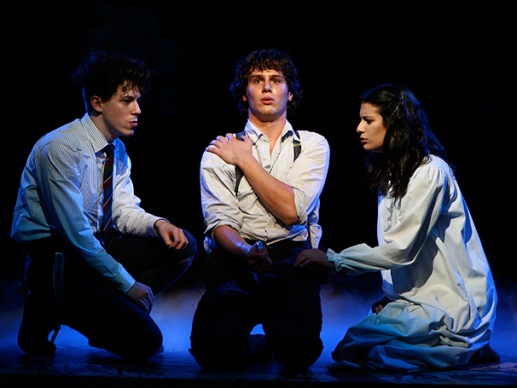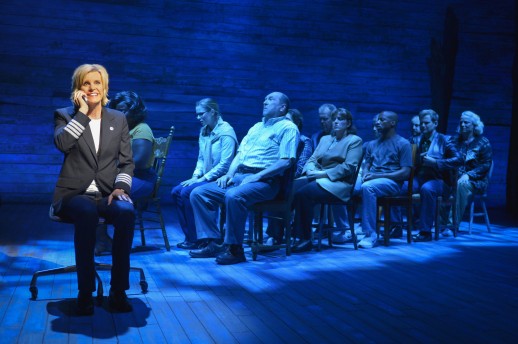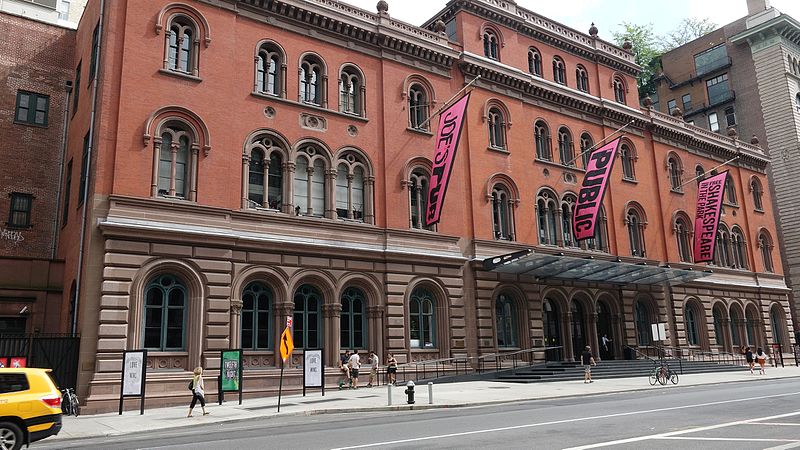
The word “etiquette” is defined by Google as “the customary code of polite behavior in society or among members of a particular profession or group”, which definitely applies to theatre. After all, a night at a theatre is a drastically different environment than a night at the movie theater. But as of late, there have many incidents to suggest that people often forget how to act in a theatre – from a patron trying to charge his phone using a fake outlet on stage, to Patti Lupone famously taking an audience member’s phone and scolding them for texting during a show. So today, I’m going to shed some light on the things you should and shouldn’t do while at the theatre.
Turn off your phone
You saw this one coming. As the cast of An American in Paris says during their Easter Bonnet parody of The Book of Mormon‘s “Turn It Off”, well, audiences seem to be trouble having doing just that. At most shows just before the lights dim, there will typically be an announcement reminding audience members to turn their electronics off, as they can be a distraction to those on stage. A good number of audience members will not take this seriously and completely ignore it, continuing to use their phones up until the overture starts.
What most people don’t realize is that the announcement is right; it is a huge distraction to actors on stage, and other audience members. It’s not just the sound of your default iPhone ringtone if it happens to go off, it’s the light from the screen if you’re texting. Not only can other audience members see it as clear as day, actors can too. The bright stage lights often make things beyond the stage completely dark and difficult to see, helping actors to concentrate on the scene and not so much the audience – but if there’s a phone out, actors can say goodbye to their hyper focus.
This issue has become so common in theaters around the world that a West End theater in London had considered pointing a laser in the faces of those who commit this offense in theater. Even if you’re Snapchatting how you’re at Hamilton and just have to get that last lyric quote in, it can wait. If there’s suddenly an emergency, take it to the lobby. The rest of the audience will thank you.
Don’t leave during the bows
We all understand parking is expensive and you don’t want to get swept up in the rush of people leaving at the same time to get to their cars, or you just have to be first in line to meet your favorite actor at the stage door. But leaving during the bows gives the impression that you are in a rush to get out of there and don’t really have any interest in celebrating the people who entertained you.
You spent just two hours at a show, the least you could do is spend a few more minutes rewarding the actors and band for the their hard work. Plus, pushing past others who are seated around you and want to enjoy the bows in incredible rude. Just calm down and stay put. Your car won’t miss you.
Don’t talk or sing during the show
I don’t care if this is your kid’s 20th time seeing Wicked and just wants to belt out “Defying Gravity” with Elphaba. Singing along with the show while it’s being performed is completely unacceptable in any circumstance. Those who do this take away attention from the actual performers and make it seem as though they aren’t really paying attention to the show in the first place.
The same goes for talking. It’s fine to have an audible reaction to something (like laughing or gasping), but turning to a fellow audience member to ask a question about the show or critique an actor’s looks is inappropriate during the show. If you just have to tell someone, wait until intermission or after the show.
Of course, there is an exception to the no talking/singing rule: if you’re prompted to do so by the actors. The 2013 revival of Pippin is known for its audience participation in the song “No Time At All”. Despite this cases like this, always use your better judgement and remember that there’s a time and a place for everything.
What’s an instance where you saw someone not following theatre etiquette that made you angry? Should I make another post on theatre etiquette in the future? Tell me in the comments!








